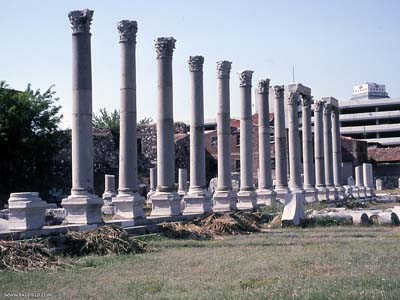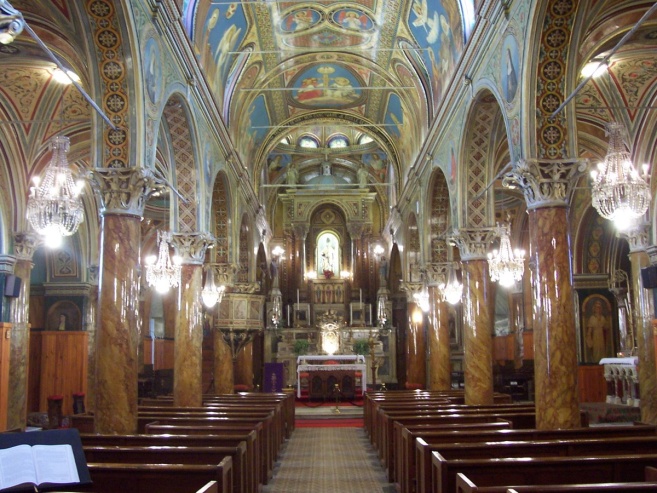





Church of Smyrna – The Persecuted Church
2. The Church of Smyrna - Rev 2:8 -11
Rev 2:8 "To the angel of the church in Smyrna write: These are the words of him who is the First and the Last, who
died and came to life again.
Rev 2:9 I know your afflictions and your poverty--yet you are rich! I know about the slander of those who say they are
Jews and are not, but are a synagogue of Satan.
Rev 2:10 Do not be afraid of what you are about to suffer. I tell you, the devil will put some of you in prison to test you,
and you will suffer persecution for ten days. Be faithful, even to the point of death, and I will give you life as
your victor's crown.
Rev 2:11 Whoever has ears, let them hear what the Spirit says to the churches. The one who is victorious will not be hurt
at all by the second death.
Rev 2:8 "To the angel of the church in Smyrna write: These are the words of him who is the First and the Last, who
died and came to life again.
Rev 2:9 I know your afflictions and your poverty--yet you are rich! I know about the slander of those who say they are
Jews and are not, but are a synagogue of Satan.
Rev 2:10 Do not be afraid of what you are about to suffer. I tell you, the devil will put some of you in prison to test you,
and you will suffer persecution for ten days. Be faithful, even to the point of death, and I will give you life as
your victor's crown.
Rev 2:11 Whoever has ears, let them hear what the Spirit says to the churches. The one who is victorious will not be hurt
at all by the second death.


Ruins of the Church of Smyrna St. Polycarp Church in Izmir
History and background of Smyrna
Smyrna was a proud and beautiful city and regarded itself as the “pride of Asia.” The people of Smyrna were quite sensitive to the rivalry of Ephesus for recognition as the most splendid city of Asia Minor.
A straight sail from the island of Patmos of some 60 miles brings one to the port of Ephesus at the mouth of the river Cayster. Traveling up coast some 35 miles almost due north of Ephesus is the city of Smyrna .
Unlike Ephesus, Smyrna still exists today — as Izmir in Turkey. Its church is still there. The Saint Polycarp Church is the oldest church in Izmir and represents ancient Smyrna's role as one of the Seven Churches of Revelation. The church in Smyrna was an offshoot of Paul’s church in Ephesus.
Saint Polycarp was converted by the John the Apostle and became Bishop of Smyrna. He was martyred by the Romans at age 86 in 155 AD at Kadifkale, which was atop the hill near modern-day Izmir. According to tradition, when they tried to burn Polycarp at the stake, the flames wouldn't touch him. They finally stabbed him to death.
Smyrna took its name from ‘myrrh’, in which it did much trade. The infant Jesus received myrrh as one of the gifts from the three wise men — a foretelling of His suffering and death. Myrrh is an antiseptic herb which prevents decay and is most fragrant, like balsam. It also acts as an anaesthetic. Jesus was given myrrh mixed with bitter wine while hanging in agony on the Cross to help alleviate His pain. Later, He was generously embalmed with it. The more myrrh is crushed, the more beautiful its scent.
Myrrh is a sap-like substance (resin) that comes out of cuts in the bark of trees and is used to make medicine. Myrrh is used for indigestion, ulcers, colds, cough, asthma, lung congestion, arthritis pain, cancer, leprosy, spasms, and syphilis. It is also used as a stimulant and can help decrease swelling (inflammation) and kill bacteria.
Myrrh can also be applied directly to the mouth for soreness and swelling, inflamed gums (gingivitis), loose teeth, canker sores, bad breath, and chapped lips. It is also used topically for hemorrhoids, bedsores, wounds, abrasions, and boils.
In foods and beverages, myrrh is used as a flavoring component. In manufacturing, myrrh is used as a fragrance in incense, and as a fixative in cosmetics. It is also used in embalming.
Problems at Smyrna
The letter to Smyrna contains no admonishment but the church at Smyrna apparently suffered at the hands of a group “who say they are Jews and are not, but are a synagogue of Satan” (2:9). These Jews thought they were the people of God but were actually the representatives of his adversary (John 8:31-47). The people referred to were probably Jewish citizens of Smyrna who opposed the church. They may have been pressing the local government to take action against the Christians.
Why are these people said not to be Jews? They were Jews by race and religion. But they were not spiritual Jews, in the sense that the New Testament defines a Jew. Paul made the point in his writings: “A man is a Jew if he is one inwardly; and circumcision is circumcision of the heart, by the Spirit” (Romans 2:29). The church saw itself as the Israel of God, the “true circumcision” who worshiped God in Spirit and put its faith in Jesus Christ (Philippiams 3:3). Of the 7 churches, only Smyrna and Philadelphia receive no complaint from the Lord. There is only commendation, encouragement and a promise of eternal life to the one who overcomes. The letter is devoted almost exclusively to an account of their past and present trials, a warning of yet more persecution to come, and a strengthening word of encouragement from the One who knows all too well the pain of scorn and death.
Why did the church in Smyrna suffer? The answer is two-fold.
First, as early as 195 b.c. a temple personified as a goddess and dedicated to Rome had been built in Smyrna. The city soon acquired a reputation for patriotic loyalty to the empire and its emperor. In 29 a.d. all Asian cities were competing for the coveted favor of erecting a temple in honor of Emperor Tiberius. Smyrna won! It was a city fervent with emperor worship. The Christian refusal to sprinkle incense on the fire which burned before the emperor’s bust no doubt fanned the flames of hostility against them. It was dangerous to be a faithful Christian in Smyrna.
Second, great hostility existed within the Jewish community toward the church. This no doubt stemmed in part from their conviction that to worship a crucified carpenter from Nazareth was blasphemy. There was also undoubtedly a measure of bitterness at the loss of so many from their ranks to the new faith. The Jews were known to inform the authorities of Christian activities, the latter being perceived as treason. Jewish hostility against Paul is well known in the book of Acts (at Antioch in Acts 13:50; at Iconium in Acts 14:2,5; at Lystra in Acts 14:19; at Thessalonica in Acts 17:5; at Corinth they so bitterly opposed the gospel that Paul “shook out his garments and said to them, ‘Your blood be upon your heads! I am innocent. From now on I will go to the Gentiles’”).
They were facing martyrdom itself. Yet Jesus refrains from intervening. He does not remove the poverty nor does he vindicate his people in the face of those who hurled their indignant slander, nor does he overturn the vicious actions of the Devil who will instigate the imprisonment and even their deaths. Why? Perhaps instead of asking the question, “Why do Christians suffer persecution?” we should ask, “Why do Christians not suffer persecution?” Says Stott:
“The ugly truth is that we tend to avoid suffering by compromise. Our moral standards are often not noticeably higher than the standards of the world. Our lives do not challenge and rebuke unbelievers. The world sees in us nothing to hate”
History and background of Smyrna
Smyrna was a proud and beautiful city and regarded itself as the “pride of Asia.” The people of Smyrna were quite sensitive to the rivalry of Ephesus for recognition as the most splendid city of Asia Minor.
A straight sail from the island of Patmos of some 60 miles brings one to the port of Ephesus at the mouth of the river Cayster. Traveling up coast some 35 miles almost due north of Ephesus is the city of Smyrna .
Unlike Ephesus, Smyrna still exists today — as Izmir in Turkey. Its church is still there. The Saint Polycarp Church is the oldest church in Izmir and represents ancient Smyrna's role as one of the Seven Churches of Revelation. The church in Smyrna was an offshoot of Paul’s church in Ephesus.
Saint Polycarp was converted by the John the Apostle and became Bishop of Smyrna. He was martyred by the Romans at age 86 in 155 AD at Kadifkale, which was atop the hill near modern-day Izmir. According to tradition, when they tried to burn Polycarp at the stake, the flames wouldn't touch him. They finally stabbed him to death.
Smyrna took its name from ‘myrrh’, in which it did much trade. The infant Jesus received myrrh as one of the gifts from the three wise men — a foretelling of His suffering and death. Myrrh is an antiseptic herb which prevents decay and is most fragrant, like balsam. It also acts as an anaesthetic. Jesus was given myrrh mixed with bitter wine while hanging in agony on the Cross to help alleviate His pain. Later, He was generously embalmed with it. The more myrrh is crushed, the more beautiful its scent.
Myrrh is a sap-like substance (resin) that comes out of cuts in the bark of trees and is used to make medicine. Myrrh is used for indigestion, ulcers, colds, cough, asthma, lung congestion, arthritis pain, cancer, leprosy, spasms, and syphilis. It is also used as a stimulant and can help decrease swelling (inflammation) and kill bacteria.
Myrrh can also be applied directly to the mouth for soreness and swelling, inflamed gums (gingivitis), loose teeth, canker sores, bad breath, and chapped lips. It is also used topically for hemorrhoids, bedsores, wounds, abrasions, and boils.
In foods and beverages, myrrh is used as a flavoring component. In manufacturing, myrrh is used as a fragrance in incense, and as a fixative in cosmetics. It is also used in embalming.
Problems at Smyrna
The letter to Smyrna contains no admonishment but the church at Smyrna apparently suffered at the hands of a group “who say they are Jews and are not, but are a synagogue of Satan” (2:9). These Jews thought they were the people of God but were actually the representatives of his adversary (John 8:31-47). The people referred to were probably Jewish citizens of Smyrna who opposed the church. They may have been pressing the local government to take action against the Christians.
Why are these people said not to be Jews? They were Jews by race and religion. But they were not spiritual Jews, in the sense that the New Testament defines a Jew. Paul made the point in his writings: “A man is a Jew if he is one inwardly; and circumcision is circumcision of the heart, by the Spirit” (Romans 2:29). The church saw itself as the Israel of God, the “true circumcision” who worshiped God in Spirit and put its faith in Jesus Christ (Philippiams 3:3). Of the 7 churches, only Smyrna and Philadelphia receive no complaint from the Lord. There is only commendation, encouragement and a promise of eternal life to the one who overcomes. The letter is devoted almost exclusively to an account of their past and present trials, a warning of yet more persecution to come, and a strengthening word of encouragement from the One who knows all too well the pain of scorn and death.
Why did the church in Smyrna suffer? The answer is two-fold.
First, as early as 195 b.c. a temple personified as a goddess and dedicated to Rome had been built in Smyrna. The city soon acquired a reputation for patriotic loyalty to the empire and its emperor. In 29 a.d. all Asian cities were competing for the coveted favor of erecting a temple in honor of Emperor Tiberius. Smyrna won! It was a city fervent with emperor worship. The Christian refusal to sprinkle incense on the fire which burned before the emperor’s bust no doubt fanned the flames of hostility against them. It was dangerous to be a faithful Christian in Smyrna.
Second, great hostility existed within the Jewish community toward the church. This no doubt stemmed in part from their conviction that to worship a crucified carpenter from Nazareth was blasphemy. There was also undoubtedly a measure of bitterness at the loss of so many from their ranks to the new faith. The Jews were known to inform the authorities of Christian activities, the latter being perceived as treason. Jewish hostility against Paul is well known in the book of Acts (at Antioch in Acts 13:50; at Iconium in Acts 14:2,5; at Lystra in Acts 14:19; at Thessalonica in Acts 17:5; at Corinth they so bitterly opposed the gospel that Paul “shook out his garments and said to them, ‘Your blood be upon your heads! I am innocent. From now on I will go to the Gentiles’”).
They were facing martyrdom itself. Yet Jesus refrains from intervening. He does not remove the poverty nor does he vindicate his people in the face of those who hurled their indignant slander, nor does he overturn the vicious actions of the Devil who will instigate the imprisonment and even their deaths. Why? Perhaps instead of asking the question, “Why do Christians suffer persecution?” we should ask, “Why do Christians not suffer persecution?” Says Stott:
“The ugly truth is that we tend to avoid suffering by compromise. Our moral standards are often not noticeably higher than the standards of the world. Our lives do not challenge and rebuke unbelievers. The world sees in us nothing to hate”











